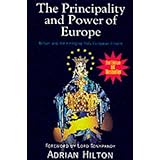The following is quoted from Adrian Hilton's book The Principality and Power of Europe.
It illustrates the key question at stake in the forthcoming referendum. We have sacrificed sovereignty, freedom and real democracy by entering the EEC/EU.
 The assurance given to both the British people and to Parliament in 1973 by the then prime minister, Edward Heath, was that there was 'no question of any erosion of essential national sovereignty.' In other words, Britain was to be part of a community of sovereign nations who wished to trade with each other. Over and over again, that was the message that was hammered home to the electorate. Heath further gave the assurance: 'There are some in this country who fear that in going into Europe, we shall in some way sacrifice independence and sovereignty... These fears, I need hardly say, are completely unjustified...' The truth is that much more was surrendered than the electorate was led to believe. The European Court of Justice states: 'Every national court must apply Community law in
The assurance given to both the British people and to Parliament in 1973 by the then prime minister, Edward Heath, was that there was 'no question of any erosion of essential national sovereignty.' In other words, Britain was to be part of a community of sovereign nations who wished to trade with each other. Over and over again, that was the message that was hammered home to the electorate. Heath further gave the assurance: 'There are some in this country who fear that in going into Europe, we shall in some way sacrifice independence and sovereignty... These fears, I need hardly say, are completely unjustified...' The truth is that much more was surrendered than the electorate was led to believe. The European Court of Justice states: 'Every national court must apply Community law in
It is now generally accepted by British judges that European law takes precedence over Acts of Parliament. Parliament has, therefore, surrendered its sovereignty. Where there is any disagreement about Britain's actions, it is the European Court of Justice that decides what is right. The former Master of the Rolls, Lord Denning, stated' No longer is European law an incoming tide flowing up the estuaries of England. It is now like a tidal wave bringing down our sea walls and flowing inland over our fields and houses, to the dismay of us all.'
The Lord Chancellor wrote to Heath on 14th December 1960 in response to Heath's enquiry into the constitutional implications of becoming a signatory to the Treaty of Rome. He stated: 'To satisfy the requirements of the treaty, Parliament could enact legislation which would give automatic force of law to any existing or future regulations made by...the Community. This would go far beyond the most extensive delegation of powers, even in wartime, that we have ever experienced... It is clear...that the (European) Council of Ministers could eventually...make regulations that would be binding on us even against our wishes... It is the first step on the road that leads...to the fully federal state.' As the most senior legal officer in the land, he went on to warn: 'I must emphasise that in my view the surrenders of sovereignty involved are serious ones...these objections ought to be brought out into the open...' To have been warned of this, and then to continue with the assertion that there would be no loss of sovereignty, is blatant proof of Heath's duplicity.
One of the founding fathers of the EU, Jean Monnet, also a devout Roman Catholic, totally rejected the idea that Europe should consist of sovereign nations. He believed in the Catholic vision that Europe should become a federal superstate, into which all ancient nations would be fused. 'Fused' is the word he used in a communication dated 30th April 1952, and is wholly consistent with the language of the Maastricht Treaty.


